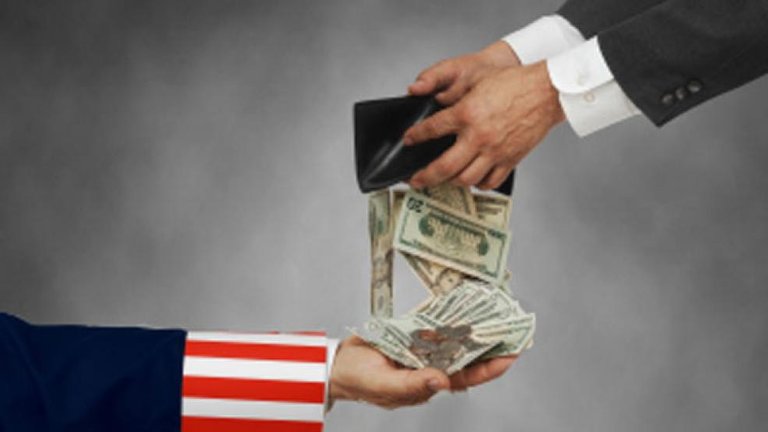This week we saw the first major implementation of trade tariffs on China from the USA. On this week's upcoming "GeekRant" podcast, we discuss the impact of this on consumer electronics and the costs.

In doing research for this discussion, I unearthed some statistics that you might be interested in:
- USA has a population of 323 million
- The average adult American spends $1200 per year on technology (not incl. businesses)
- Kids/teenagers also account for $350-$500 of technology purchases per year
- If we assume 90% of these products come from China, and are hit with a 25% trade tariff, this will generate an additional $82 Billion of revenue for Uncle Sam
- This represents an additional annual cost to each US consumer of $336 per year
Interesting numbers. Let's face it... Tariffs are TAXES. This is not about trying to coerce US workers to make the products made in China. This is about extracting more income for the US government from its citizenry. But without risking anyone's political career over it. These tariffs are not a matter of "if" but "when" and the latest news has an additional $267 billion on tariffs being readied to be levied on China in the next few weeks. Ultimately over half a trillion dollars of trade per year will be taxed at 25%, of which your local store will pass that cost directly onto you.

However our discussion continued to look at the entire supply chain that will be affected and that's where it gets scary. If products are not able to be afforded to be imported, then you will be replacing a Chinese factory worker making $5K per year with a US factory worker making $60K per year. Now things get expensive. Big time. Every step in the chain will go up in price, and it won't take long before hyper-inflation takes hold.
How does the US manage this? Simple. Raise interest rates. Our artificial interest rates since the 2008 collapse will start to go through the roof. The base rate will likely exceed 2.5% this year, but it could be raised as much as 5-6% in the following year if the risk of escalating prices start to really kick in. I mean the US Federal Reserve has no other real option to curb hyper-inflation than to use the tool of interest rates.
What does this mean for you?
It's time to pay attention. Start to look for ways to make your technology gadgets last longer. You don't need the latest (fill in the product name here). When they tell you some BS that it is all about security patches or that if you don't upgrade product X, you will be vulnerable to security risks, etc. it is time for us to reject this notion and send a clear message back to the manufacturers that we expect them to honor their obligation to their products and continue to provide security updates or not create some crappy, vulnerable product that can be hacked.
Second, you need to pay down/off your debts. That means credit cards, student loans, and car loans. Mortgages should be locked down for 15 or 30 yr loans at the lowest possible interest rates. If you don't have the money, then stop spending. You got yourself into this mess - now you gotta get yourself out. Get an extra job (yes there are loads of these around) and get every member of your family earning income. Stop speculating on what "might" happen as a crutch to avoid the personal responsibility of debt payment, and MAKE IT HAPPEN. Sell of the crap you don't need and pay off the debts left over. Stop hoarding old things around because they make you feel better about yourself, and start thinking minimalism. The cost of the real estate alone to store all your crap is a liability you cannot afford to carry right now.

If you want to be able to get through the upcoming economic times, you need to be as dynamic and flexible as you can be. That means before you make a decision to take on credit (yes, YOU make that decision - no one makes it for you), make sure you have really thought things through. Do you really need that new (insert product here)? If it is to try and impress your friends, then you have a really low quality of friends. You don't need to look the part before you have got the part. The truth is that recycling or extending the life of things we have will not only protect your economic position, but it helps reduce waste and trash on the planet.
If you are interested, this will all be discussed on this week's "GeekRant" podcast at http://www.elementopie.com It is episode 336.
Thanks for another post @k0d3g3ar 👍😊
What do you think will happen to the USD in relation to foriegn currencies like the Philippine Peso?
~ @chrisrice
The USD is the Petro Dollar and backs most of the world economies. If it goes down, so does anything tied to it. Think of it like BTC. If BTC goes down, then Alt coins go down. They are not the same thing but one typically backs the other. When BTC price dropped from $15K to $7K, ETH dropped from $900 to $500. Sometimes the proportions may be skewed, but the same rationale applies.
Currencies that are not attached to the Petro dollar may not be affected by this. But the world is a global supply chain, so anyone participating in the process of getting products from manufacturer to consumer is going to take a hit here. That includes shipping, local tax authorities, packaging companies, wholesalers, and retailers. End to end pain, unfortunately.
And the other issue is that certain regions that are based on trade have lots of peripheral businesses there to service the needs of the workers in those regions. Consider a simple food store that is near a trading center. If the trading center downsizes due to trade restrictions, that food store may go out of business. In doing so, their staff are laid off and can no longer spend money. That affects all the people they do business with. The dominoes fall rather quickly here.
The downside of a world economy and global supply chain system like this is that all the interconnecting components (incl. your local currency) all get affected. Some more than others, but a downturn in trade that turns into a downturn in employment means less money in the financial system, thereby making the existing money in that system more valuable. If Federal Reserves artificially inflate the monetary supply, then the value of our dollars right now is diluted and consequently your money has less buying power.
Economists have been pretending to be the Penn & Teller of money for decades and it is all a game. Until we create a society based on decentralized communities with a mutually agreed protocol on how we can integrate in terms of trade, respect, etc. then we will forever be subject to central power struggles like this and no one wins.
I am interested to know if the USD will remain strong compared to the PHP, and if it will increase in strength.
The money I earn is in USD so it benefits me when the conversion rate for USD is high. If the US Federal Reserve Bank continues to raise interest rates, I think the PHP will continue to weaken against the dollar.
That helps me a little bit since the debt I have is in PHP. It also benefits the many Filipinos who earn USD, or receive remittances from the states.
I think Steem has an advantage over Bitcoin, since the transactions in Steem are feeless, but Bitcoin transactions carry a fee.
It's hard to tell, and this is definitely not financial advice. However I have been tracking the USD to the Mexican Peso of late, and even with the NAFTA trade agreement meetings, etc. here, the Mexican Peso is trading today at about 19:1 to the $USD. I've seen peaks around 21:1, but over the past 12 months (pre-NAFTA trade) it hasn't changed more than 10%. Just remember that most world currencies are tied to the $USD, so the exchange between countries might end up in the local currency but typically the global transactions are traded in $USD. I believe you are referring to how your local currency will convert from $USD to PHP, so I think the USD is strong and will likely maintain that position. We've seen other countries (e.g. Australia) experience a downgrade in their currency value due to their close ties to China for resources.
As for Steem vs. Bitcoin, BTC is still the gold standard for crypto-currencies. The fees vary but with Segwit and Lightning Network, those fees should be reduced to almost nothing over the next 12-24 months as long as your exchange embraces these technology upgrades.